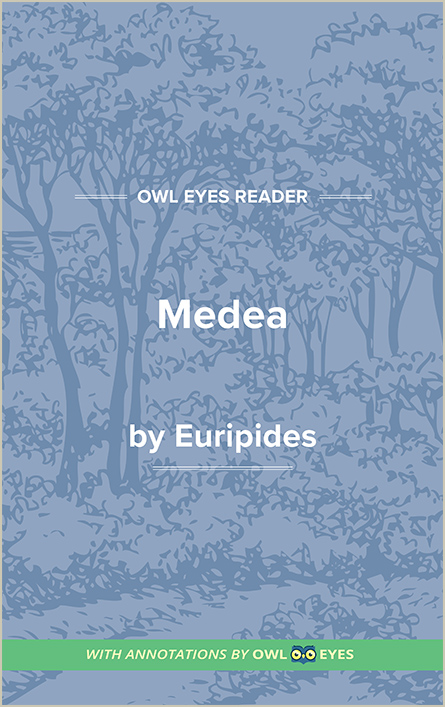Analysis Pages
Themes in The Medea
Vengeance: Medea’s anger in this play is justified: Jason abandons her and proves that he never actually loved her. In myths leading up to this play, Medea betrays her family, sacrifices her brother, commits murder, and abandons the life she built in order to secure Jason’s success. Not only does he leave her for the young, beautiful daughter of the king, he does nothing to stop the king from exiling Medea from Corinth. For all of these reasons, the chorus, the moral center of the Greek tragedy, supports Medea as she plots her revenge. They support her plot to kill the woman for whom Jason leaves her and her decision to kill the king who assented to the destructive union. However, Medea’s vengeance goes too far in the eyes of the chorus when she decides to murder her children as revenge against Jason. The chorus warns Medea that in hurting Jason in this way, she will cause herself far more pain. But Medea declares that the pain she will suffer is worth the horror it will cause Jason. Euripides explores the limits of vengeance and punishment in depicting this perverse, excessive, and horrifying response to betrayal.
Kleos: In ancient Greece, kleos meant renown or glory. It implies hearing or fame that comes from hearing about someone’s heroic deeds. Greek heroes achieved kleos by performing great deeds or sacrificing themselves for larger causes. This fame and honor was passed down from father to son. The son was responsible for living up to his father’s glory and continuing the family line by building on the glory of their father. In killing Jason’s sons, Medea cuts his kleos short. She ends his kleos line, therefore destroying the glory from his heroic acts. This is the ultimate form of punishment that she can leverage against him after his betrayal.
Oikos: In ancient Greek, the word oikos referred to the family, property, and people of which the family was in charge. Oikos was the basic unit that made up society in Greek city-states. The head of the house, the father, was responsible for protecting the family and representing the family’s interests to the wider citizenry. The mother provided for slaves and children, cared for the sick, cooked, cleaned, and made clothes. In wealthier families, the mother was in charge of coordinating all of these activities among her slaves and servants. Since oikos was essential to the stability of the city, fidelity to one’s family and role within that family was extremely important. Adultery was punishable by exile or death and failing or betraying one’s family was a dishonor from which none could socially recover. Jason’s decision to abandon Medea and his children to marry Glauce in order to advance his social position is an egregious betrayal of oikos. This betrayal causes his tragic downfall; he is punished so that the audience learns extreme importance of fidelity to one’s family.
Male Hubris: Throughout the play, male characters Jason and Creon underestimate and disregard Medea. Despite her demonstrated magical powers, both men believe that they can control her in order to achieve their own desires. This can be seen as an arrogant hubris, or destructive pride. This pride blinds both men to Medea’s true aims and prevents them from stopping her revenge.
Themes Examples in The Medea:
The Medea
🔒"Oft have I seen, in other days than these, How a dark temper maketh maladies No friend can heal...." See in text (The Medea)
"Her lord, if he be wearied of the face Withindoors, gets him forth;..." See in text (The Medea)
"And Jason suffers him? Oh, 'tis too sore!..." See in text (The Medea)
"pride..." See in text (The Medea)
"who didst kill My sons, and make me as the dead:..." See in text (The Medea)
"What here Was yours, your father stole...." See in text (The Medea)
"For never child of mine shall Jason see Hereafter living, never child beget From his new bride..." See in text (The Medea)
"He hath not dared to do, Jason, a thing so shameful?..." See in text (The Medea)
"Now God in heaven be witness, all my heart Is willing, in all ways, to do its part For thee and for thy babes...." See in text (The Medea)
"Here am I To help thee, woman, pondering heedfully Thy new state...." See in text (The Medea)
"Nor all thy crafts shall help thee..." See in text (The Medea)
"So hath it been with me. A wise-woman I am; and for that sin To divers ill names men would pen me in;..." See in text (The Medea)
"Which, ere yet it be too late, I sweep aside. ..." See in text (The Medea)
"It is but just, Thou smite him...." See in text (The Medea)
"There is no house! ..." See in text (The Medea)
"He dreameth of the bed Of this new bride, and thinks not of his sons...." See in text (The Medea)
"Medea calleth up the oath they made,..." See in text (The Medea)

